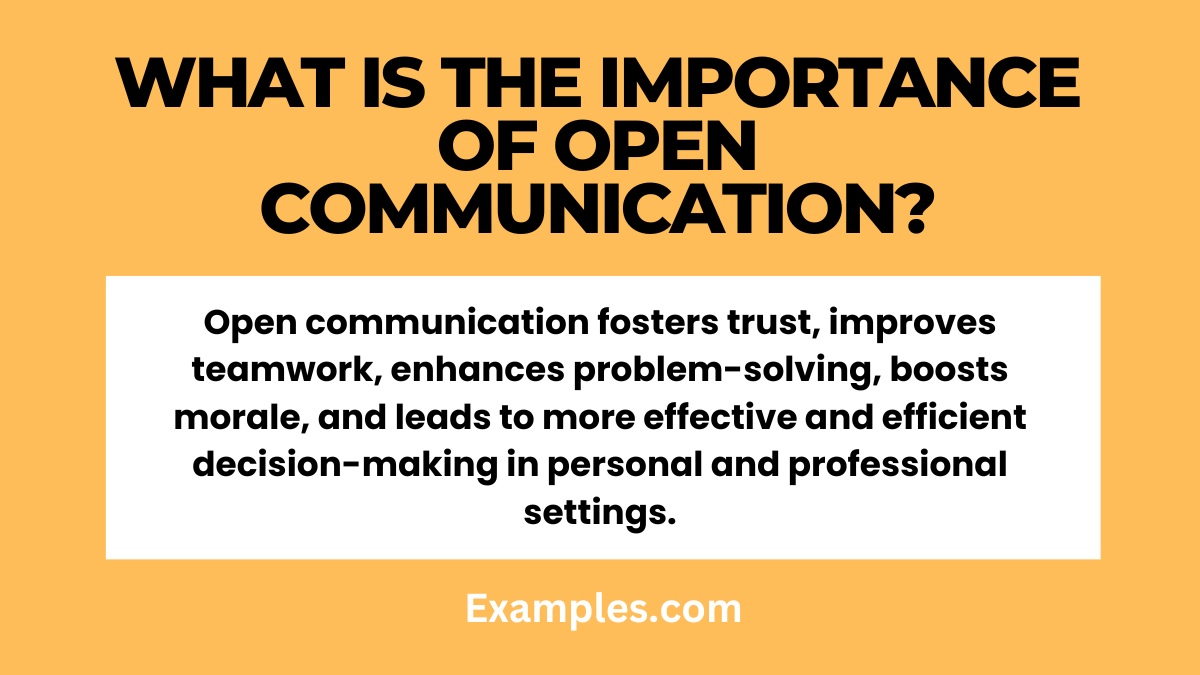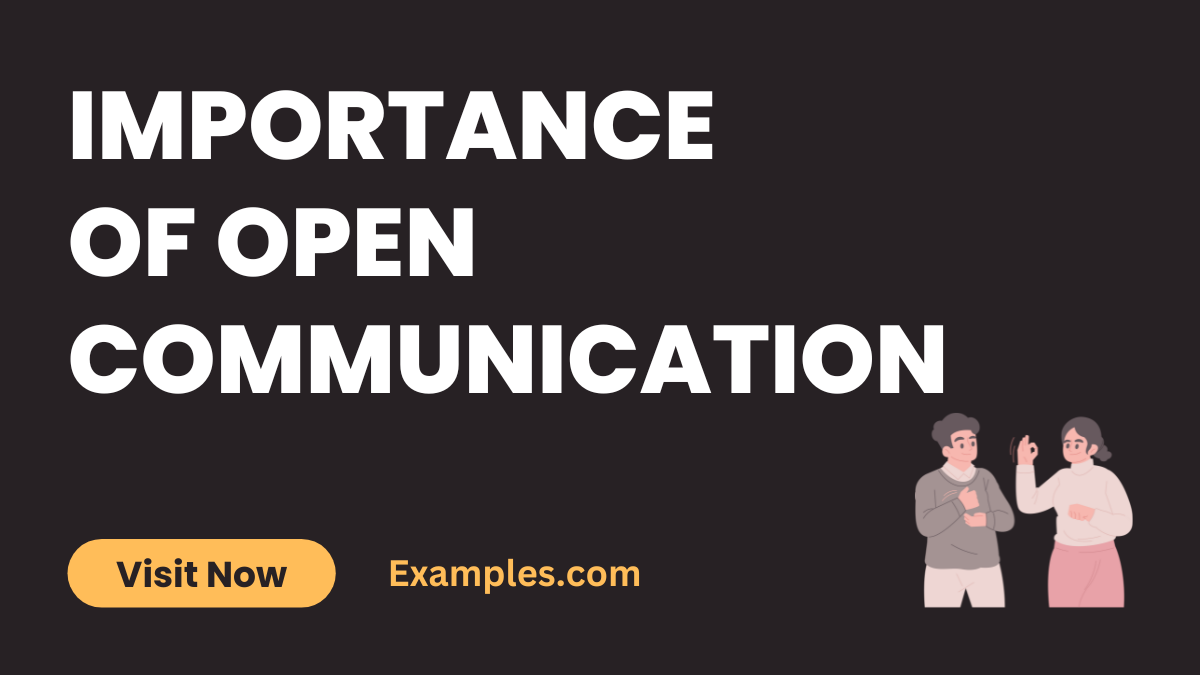Importance of Open Communication
Open communication stands as a cornerstone in fostering positive relationships and effective business environments. This comprehensive guide delves into the vital role of open dialogue, highlighting its impact through real-world communication examples. From enhancing team dynamics to nurturing personal connections, we explore how open communication shapes interactions and decision-making processes. Discover its transformative power and learn strategies to implement it in various aspects of life and work. Embrace open communication for a more connected and productive world.
Download Importance of Open Communication in PDFWhat is the Importance of Open Communication? – Meaning

Open communication is the practice of sharing thoughts, feelings, and information freely and honestly in a conversation. It’s characterized by transparency, active listening, and a respectful exchange of ideas. This approach is crucial in both personal and professional settings, as it fosters trust and understanding among individuals. Open communication helps to avoid miscommunication examples and reduces instances of bad communication, leading to stronger, more productive relationships. It’s a key element in ensuring that all voices are heard and valued, paving the way for collaborative problem-solving and innovation.
The Importance of Open Communication
Open communication is a vital aspect of all forms of human interaction, whether in personal relationships, educational settings, or professional environments. Its significance lies in its ability to foster understanding, trust, and collaboration, leading to more effective and harmonious interactions.
Fostering Understanding and Clarity
One of the primary benefits of open communication is the clarity it brings to interactions. It allows individuals to express their thoughts and feelings in a straightforward and honest manner, reducing the chances of misunderstandings and misinterpretations. This clarity is especially crucial in communication in the workplace, where precise information exchange is necessary for the successful completion of tasks and projects.
Building Trust
Trust is the foundation of any strong relationship, and open communication is key to building and maintaining this trust. When people communicate openly, they demonstrate honesty and vulnerability, which in turn fosters a sense of trust and security among participants. This is particularly important in business communication, where trust can significantly impact team dynamics and overall productivity.
Enhancing Collaboration and Teamwork
Open communication encourages the free exchange of ideas and opinions, which is essential for effective teamwork and collaboration. In environments where open communication is practiced, team members feel valued and empowered to contribute their unique perspectives, leading to more innovative solutions and better decision-making. This aspect is vital in achieving good communication standards in team settings.
Promoting a Healthy Work Culture
In a professional context, open communication contributes significantly to creating a positive and healthy work culture. It encourages a sense of mutual respect and understanding among colleagues, which is essential for a supportive and productive work environment. Open communication in the workplace also plays a crucial role in employee satisfaction and retention.
Strengthening Personal Relationships
The importance of open communication extends beyond the professional sphere and is equally critical in personal relationships. It allows individuals to share their feelings, desires, and concerns openly, leading to deeper connections and stronger bonds. The importance of open communication in relationships cannot be overstated, as it is key to maintaining healthy, long-lasting partnerships.
Facilitating Conflict Resolution
Open communication is an effective tool in resolving conflicts. It allows for a respectful and honest discussion of issues, enabling individuals to understand each other’s perspectives and work towards a mutually acceptable solution. This approach can prevent minor misunderstandings from escalating into major disputes, thereby maintaining harmony.
Encouraging Personal and Professional Growth
Finally, open communication encourages both personal and professional growth. It allows for constructive feedback and critical discussions, which are essential for continuous learning and improvement. This growth-oriented approach is beneficial not just for individuals but also for organizations as a whole.
In conclusion, the importance of open communication is manifold. It is the cornerstone of effective and meaningful interactions, fostering environments where ideas flourish, relationships deepen, and conflicts are resolved amicably. By prioritizing open communication, we can build stronger, more resilient, and more productive communities.
Reasons of Importance of Open Communication
The significance of open communication extends beyond mere exchange of information; it is a vital component for success and harmony in both personal and professional arenas. Here are some key reasons why open communication holds such importance:
- Builds Trust and Transparency: Open communication fosters a sense of trust and transparency among individuals. In a work environment, when leaders and employees engage in honest and direct communication, it builds a culture of trust. This transparency is critical for developing strong relationships and a cohesive team environment.
- Enhances Team Collaboration: Effective communication in the workplace is synonymous with better collaboration. Open channels of communication allow team members to share ideas, provide feedback, and work together towards common objectives more efficiently. This collaborative atmosphere is conducive to innovation and creative problem-solving.
- Prevents Misunderstandings: One of the key benefits of open communication is the reduction in misunderstandings. By encouraging clear and direct dialogue, potential issues can be addressed promptly, ensuring that small misunderstandings do not escalate into larger conflicts.
- Improves Conflict Resolution: Open communication is a powerful tool in conflict resolution. It enables individuals to express their viewpoints and understand others’ perspectives in a respectful manner. This understanding is crucial for resolving disagreements and finding mutually beneficial solutions.
- Boosts Morale and Engagement: When people feel that their voices are heard and their opinions valued, it naturally boosts their morale and engagement. In workplaces, this leads to higher job satisfaction, lower turnover rates, and a more motivated workforce.
- Strengthens Personal Relationships: In personal relationships, open communication is the key to deeper connections and understanding. It allows individuals to express their feelings and needs effectively, thereby strengthening the bond between them.
- Facilitates Continuous Learning and Growth: Open communication encourages a culture of feedback and constructive criticism, which is essential for personal and professional growth. It allows individuals to learn from their experiences and continually improve themselves.
In summary, open communication is a critical factor in building strong, productive, and harmonious relationships. Whether in the context of business or personal life, the ability to communicate openly and effectively can have a profound impact on the success and well-being of individuals and organizations alike.
Why Open Communication is Important?
Open communication is crucial for several reasons, each playing a significant role in fostering healthy, effective, and productive interactions in various spheres of life.
Enhances Mutual Understanding and Reduces Confusion
Open communication is key to achieving mutual understanding among individuals. It helps in clearly expressing thoughts, feelings, and intentions, significantly reducing the chances of confusion and misinterpretations. This clarity is especially vital in complex scenarios, whether in personal situations or in the workplace, ensuring that everyone involved has a clear understanding of the situation and expectations.
Builds and Sustains Trust
Trust is a fundamental element in any relationship, and open communication is one of the most effective ways to build and sustain it. When people communicate openly, they convey honesty and transparency, essential qualities for establishing trust. In environments like the workplace, where trust is crucial for teamwork and collaboration, open communication ensures a stable and reliable foundation for professional relationships.
Fosters a Positive Work Environment
In the context of business communication, open communication contributes significantly to creating a positive and inclusive work environment. It encourages employees to share their ideas and feedback, leading to a more collaborative and innovative atmosphere. This openness not only boosts morale but also increases employee engagement and satisfaction, which are key drivers of organizational success.
Aids in Conflict Resolution
Open communication is highly effective in resolving conflicts. It enables a respectful exchange of differing viewpoints and facilitates understanding of each other’s perspectives. This approach to conflict resolution is constructive, focusing on finding mutually agreeable solutions rather than winning arguments, which is essential for maintaining harmonious relationships.
Promotes Personal and Professional Growth
Open communication encourages a culture of feedback and learning, which is crucial for personal and professional growth. Constructive criticism, when communicated openly and respectfully, can be a powerful tool for improvement and development. This aspect is particularly important in educational and professional settings, where continuous learning and adaptation are key to success.
Strengthens Personal Relationships
In personal relationships, the importance of open communication cannot be overstated. It allows individuals to express their needs, desires, and concerns effectively, leading to deeper connections and understanding. This open exchange of thoughts and feelings is fundamental to building strong and lasting relationships.
Encourages Inclusivity and Diversity
Open communication fosters an environment of inclusivity and diversity. By encouraging individuals to express their unique perspectives and experiences, it creates a more enriching and comprehensive dialogue. This inclusivity is vital in today’s globalized world, where diverse viewpoints can lead to more innovative and effective solutions.
In summary, open communication is important for a myriad of reasons. It enhances understanding, builds trust, creates positive environments, resolves conflicts, promotes growth, strengthens relationships, and encourages inclusivity. These benefits highlight why prioritizing open communication is essential in both personal and professional contexts.
Why is it Important to Keep the Lines of Communication Open?
Keeping communication lines open ensures clarity, prevents misunderstandings, and fosters a trusting and collaborative environment in personal and professional settings.
What are Some of the Benefits of Open Communication and Transparency?
Open communication and transparency lead to enhanced trust, better problem-solving, increased innovation, and stronger relationships in both personal and professional spheres.
Why is it Important to Have Open Conversations?
Open conversations are crucial for mutual understanding, effective conflict resolution, fostering inclusivity, and promoting continuous personal and professional growth.
The importance of open communication cannot be overstated. It is the foundation for building trust, understanding, and strong relationships in both personal and professional contexts. Open communication fosters a collaborative, innovative, and inclusive environment, essential for resolving conflicts and promoting growth. Embracing this approach can transform interactions, leading to more fulfilling and successful outcomes in all areas of life.
In concluding the article on the “Importance of Open Communication” from Examples.com, it’s essential to acknowledge the transformative power of open communication in various spheres of life. Open communication not only bridges the gap in understanding and trust among individuals but also fosters a culture of transparency and collaboration. In the workplace, this translates to improved team dynamics, greater employee satisfaction, and enhanced productivity. Leaders and team members alike benefit from the clear exchange of ideas, expectations, and feedback, leading to a more cohesive and effective work environment.
Moreover, the significance of open communication extends beyond the confines of the workplace. In personal relationships, it lays the foundation for stronger bonds, mutual respect, and understanding. Open communication encourages individuals to express their thoughts and feelings honestly and constructively, leading to deeper connections and resolution of conflicts. In an increasingly digital world, maintaining open lines of communication is vital for nurturing genuine and lasting relationships.
For further insights into the impact of open communication in different settings, the article by Penn State on the importance of open communication offers practical tips and personal reflections on the subject (available at Penn State – Presidential Leadership Academy). Additionally, Bradley University’s article on maintaining open lines of communication, particularly in healthcare, provides a detailed look at the critical role communication plays in patient outcomes and team dynamics (Bradley University Online). These resources offer valuable perspectives and underscore the universal relevance of open communication in our personal and professional lives.



